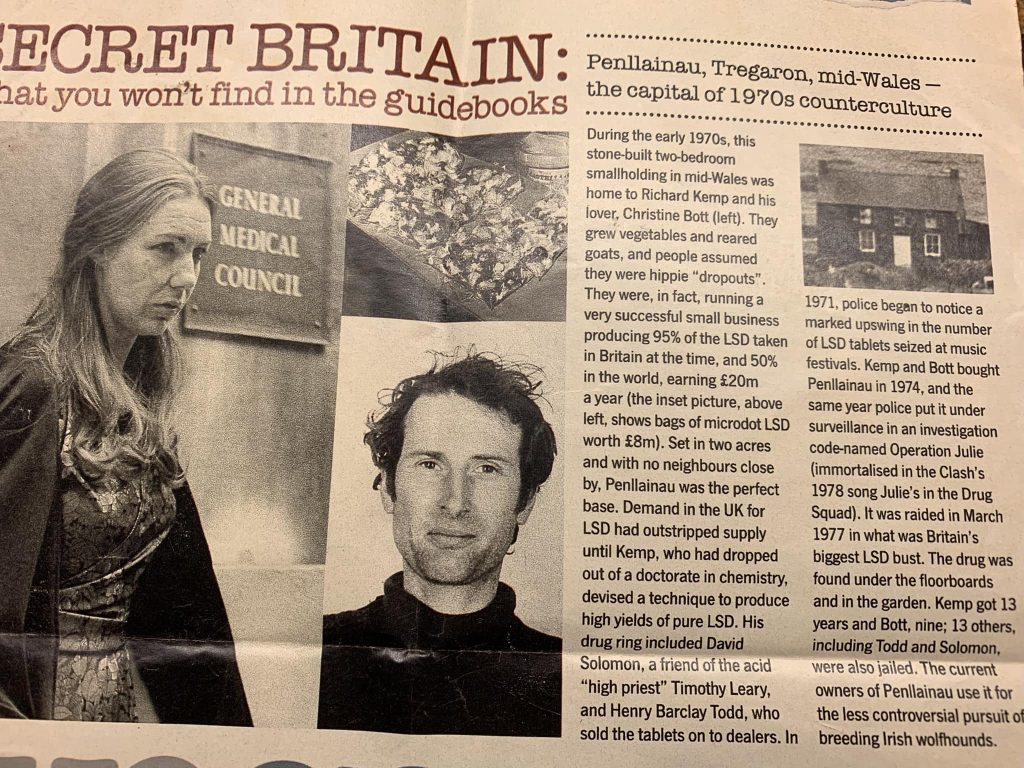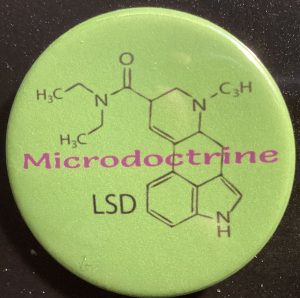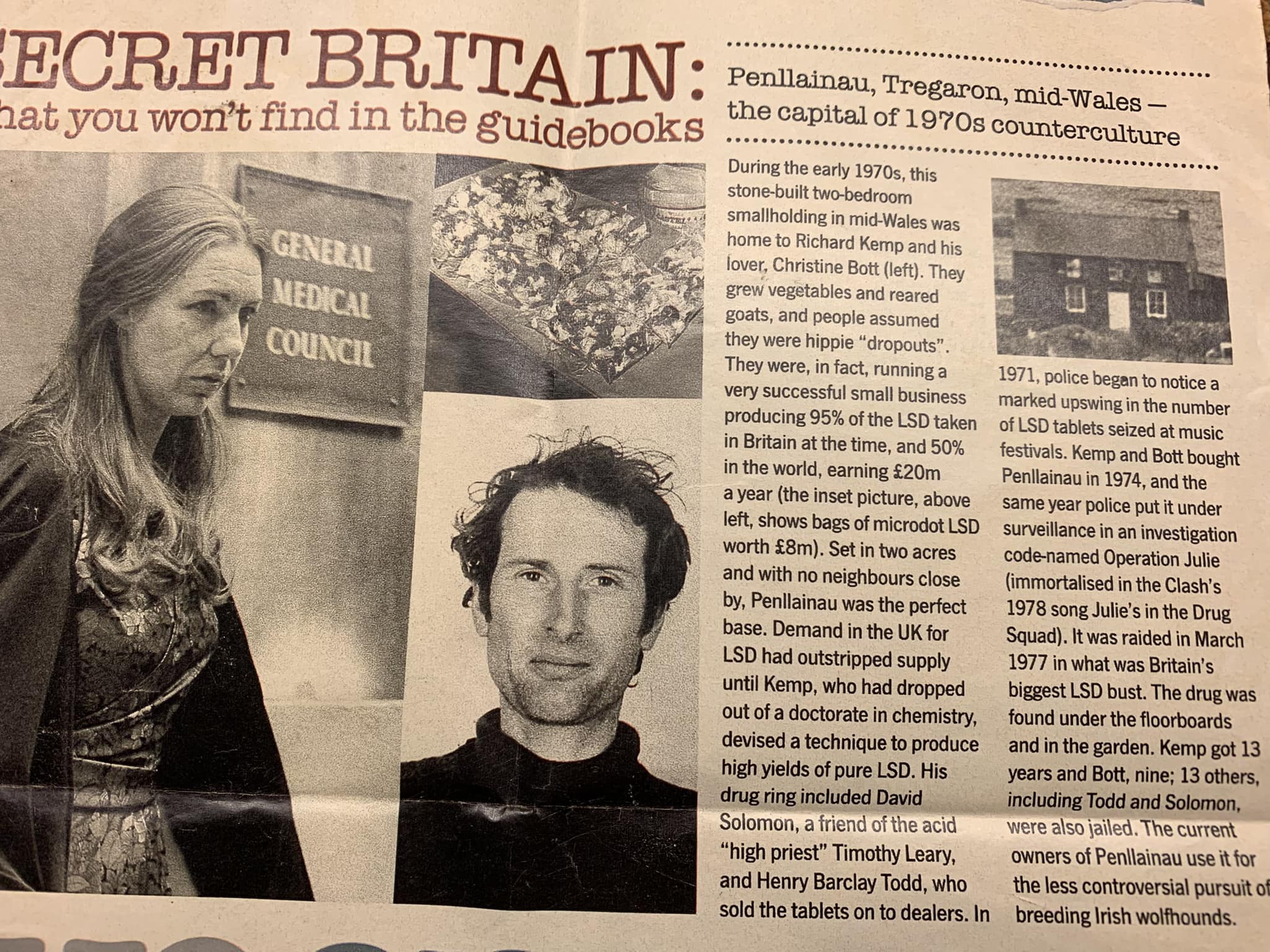BY DAVID BLACK
24 November 2022

“We need history, but not in the same way a loafer in the garden of knowledge needs it.” – Friedrich Nietzsche
In March 1977 the first national police operation in history, codenamed Operation Julie, carried out what the media hailed as the “biggest drugs raid in British history”. The drug was LSD, made by one gang in London and another in Carno, mid-Wales. In March 1978, at Bristol Crown Court, 29 defendants were handed down prison sentences totalling 170 years.
One of them – who got 13 years – was Richard Kemp, the brilliant chemist who had founded the illicit LSD enterprise back in 1968 with American Beat writer David Solomon (who got 10 years). As suggested by the six-part BBC podcast, Acid Dream, (October/November 2022), Kemp was also something a Green prophet. To a certain extent I think he was, but I fear that there is a myth in the making of what is otherwise sound history.
Acid Dream concentrates on the illegal goings in mid-Wales in 1976-7. Participants include LSD distributor, Alston Hughes; former undercover cop, Stephen Bentley; Kemp’s partner, the late Christine Bott (words spoken by an actor) and Kate Hayes, who knew Christine in her later years and published her memoirs in 2020.
What is certain is that Kemp, while on remand in prison wrote an 8,000-word statement which he intended to present at the trial in 1978, but he was dissuaded from doing so by his lawyers, who thought it to be too political and insufficiently repentant. A week after the Julie trial ended, parts of the document were published in the Cambrian News. Journalist Patrick O’Brien introduced it as ‘Microdoctrine – the beliefs behind Kemp’s LSD,’ and summarised Kemp’s views on ecology:
“On ecology and conservation Kemp believes it is obvious we are living on the world’s capital rather than its income. He says that to achieve a level of consumption that is reasonable, taking into account the Earth’s limited and dwindling resources, two things are necessary. People will have accept a lower stand of living by being content with having things which are necessary for survival, and luxuries will have to kept to minimum. Secondly these goods which are supplied will have to be built to have the longest possible lifespan, at the end of which they must be capable of being recycled… In common with expert scientific opinion he was convinced that, if Earth’s raw materials were to be conserved and pollution reduced to a tolerable level, there would have to be a revolution in people’s attitude. And he believed LSD could spark changes in outlook and put the world on the road to survival.”
Richard Kemp wrote in his own words:
“It has been my experience and that of many of those I know, that LSD helps to make one realise that happiness is a state of mind and not a state of ownership.”
And,
“Insofar as LSD can catalyze such a change in members of the public, it can contribute to this end… I have never believed that LSD is the substitute for the hard work required to change oneself. One might say it is a signpost pointing a way to self-discovery.”
In the final episode of Acid Dream, Richard Kemp – now 79 years old – breaks his 45-year silence. Kate Hayes travelled beyond these shores to his home (which he keeps secret) and interviewed him. He is no longer the idealist he was. Sadly, he has lost hope of a rational ecological solution to impending doom, but recognizes that Kate, as a mother, has to live in hope and fight on. In the taped interview with Kate, Kemp admits making money was a serious motivation for making acid, but adds,
“I think my motivation was to change the course of human history. You can’t have a much higher motivation than that. The Earth’s resources are finite. And they are being used up, and when they’re used up they’re gone. We’re changing the ecology of the planet in a way we’ll be able to feed fewer and fewer people at the same time that population is continuing to grow. So for me it was like I was never quite sure what my purpose in life was to be, and then it was as if suddenly ‘now I know why I’ve been born and now I know what I’ve got to do’. I didn’t ask myself whether I was completely sure about this for very long. I just thought I’m the right man, the right person at the right time, with the right skills and right temperament. Everything about it said ‘do it man, do it, go for it’”.
Hayes interjects to say that the late Christine Bott (who got a vicious 9 years prison sentence for being Kemp’s partner) didn’t actually regret any of it. Did he?
“I regret getting caught, I regret the fact that she got dragged down with me. If I could have got her out of it I would have done.”
Hayes suggests. “The mistake it seems was having to do the tableting at the farmhouse.” Kemp responds,
“Yeah. Well I made plenty of mistakes. No doubt about that. And it was during that period when I had the [motor] accident and the poor vicars wife died as a result of that. That’s something that I’ve got on my conscience for the rest of my life.”

Finally, actor Rhys Ifans reads Kemp’s “words, taken from his Microdoctrine written 45 years ago”:
“Before too long our planet will be facing untold challenges. Maybe not in our lifetimes, but certainly in the ones of those who come directly after us. The earth does not have inexhaustible resources and we are living on its capital, not its income. We consume and consume and consume, and bear no thoughts for what we’re doing for the path it’s putting us on. Temperatures will soar, see levels will rise, animals will perish, natural resources will evaporate before our eyes – before we have a chance to come up with a Plan B.
We will no longer be able to live off the land because the land will no longer want us. And that, that is when things will get really ugly. People will starve, be dispossessed of the places they called home. And we’ll begin to fight over the last barrel of oil, the last drop of water, the last ear of corn. Wars will be waged, bombs will be dropped, the world will become about the haves and the have nots. And eventually the rift between the ultra-rich and the ultra-poor will become unassailable because the world will have been looking the wrong way.
Politicians, businessmen, moguls – they will step on the throats of their own people to save their billions while the earth is crumbling apart beneath their feet. Then you’ll get anarchy , the word you like to band about like it’s a walk in the park. Then you’ll see what real anarchy is like. We need a revolution in people’s minds. We need a spark to put the world on a road to survival. We are living on the worlds capital, not the world’s income. And when the capital runs out I dread to think what will happen next.”
Movingly read by Ifans, the text is beautiful and terrifying; the spell binding words of an eco-prophet in fact. But it should not be quoted by the BBC as a statement from Microdoctrine in 1978; because it isn’t. True, a few memorable sentences are Kemp’s (eg “We are living on the worlds capital, not the world’s income”) but the overall passage bears as much resemblance to Kemp’s political insights in 1978, as does Tacitus’s ‘creative’ first century account of Caledonian chieftain Calgacus’s speech denouncing Roman Imperialism (“To robbery, slaughter, plunder, they give the lying name of empire; they make a solitude and call it peace”).
Questions arise. Does an authentic copy of the 8,000 word document Kemp passed to the Cambrian Times in 1978 still exist? If so, who has it and what plans are there to publish it in full? The supposed extract from Microdoctrine features in Theatr na nÓg’s production of Operation Julie – the Rock Opera, which (desrvedly) was a huge hit touring Wales in the summer of 2022. The show was written by Geinor Styles, and the passage in question found its way into the theatre program as an extract from Microdoctrine, Could it be somewhere along the way to Acid Dream writer, Tim Price, the text somehow lost its warning label: “dramatic license”? Adopting (or distorting) historical facts to suit myth-making may be great for entertainment (never let the facts get in the way of a good story, as they say). But rewriting history is politically evil and manipulative as a contribution towards saving the ecosphere from disaster. In our perilous “post-truth” world of an unstable and volatile social media facts really are sacred.
Postscript
22 February 2023 — The ending of the final episode, of the BBC Radio podcast, Acid Dream, ‘The Microdoctrine’, has been re-edited since it was originally broadcast on 22 November 2022. In this new version, the Microdoctrine “extract” has been cut, as has the statement that it consisted of Richard Kemp’s “words, taken from his Microdoctrine written 45 years ago.” The statement has been replaced by a segment featuring actors reading extracts from the dramatisation of Kemp’s views in 1978 written by Geinor Styles for Theatr na nÓg’s production of Operation Julie – the Rock Opera. There has been no explanation offered from the BBC regarding the change, or acknowledgement that it was this blog that pointed it out the error (after all it’s only a blog, right?). Still, The Barbarism of Pure Culture welcomes the BBC’s public-spirited rewriting of what was previously an unfortunate rewriting of history. The six-part podcast, Acid Dream, is on the BBC website for the rest of 2023.
References
Catherine Hayes, The Untold Story of Christine Bott
Andy Roberts, Albion Dreaming: A popular history of LSD in Britain
David Black, LSD Underground: Operation Juliem the Microdot Gang and the Brotherhood of Eternal Love


Interesting and thoughtful review David- Unfortunately, looking at your postscript on your blog- it seems you chose to not listen to episode 6 of Acid Dream.
You write: ‘The statement has been replaced by a segment featuring actors reading extracts from the dramatization of Kemp’s views .’
This is incorrect. There is a direct quote from Richard saying ‘ we thought we were saving the human race’. There are then ‘real’ clips of news readers describing various ecological disasters. I alerted the Acid Dream team to the error as a result of numerous commentators- they then investigated and chose to change things. As much as you may not believe it, by not announcing this, people’s feelings were being taken care of. However- clearly you believed you were responsible for the change- I can understand why you might believe that, but it honestly isn’t the case. It changed for a number of contributing factors.
By Patrick O’Brien
To all these intricacies and claims and counter-claims, I can add a couple of facts.
Credit, insofar as it matters, for that cleverly descriptive word ‘Microdoctrine’ belongs solely to the late Ken Hankey, a sub-editor at The Cambrian News, who dreamt it up as the single-word headline for my story about Richard Kemp published in 1978.
The second fact is that Richard sent me his hand-written statement from prison and, in the interest of balance, I got extracts printed in The Observer and in The Cambrian News (post-publication, the then managing director of The Cambrian News, Henry Read, expressed quite disapproval about the story, muttering about not wanting to give publicity to ‘criminals’).
Subsequently, I was approached by Elwyn Jones, at the time a fairly well known television writer and producer, who persuaded me to lend him the document, short-term, in connection with a piece he said he was working on for the BBC. He promised faithfully to return it quickly. I trusted him to do just that, having judged him to be someone of integrity. I was wrong. He wasn’t. Despite strenuous efforts, I failed to get the document back. Basically, he stole it, and forever afterwards I kicked myself for trusting him. I was conned. Jones died in 1982 having never, as far as I know, come up with anything at all on the LSD saga.
I knew Richard and Christine personally, while not having the faintest clue about their secret life. Overall, I think the purity of purpose of Richard’s mission (I absolutely agree with what he says about the way the world was, and is, going) was greatly diminished by the money-making motive, though I’m sure others in the enterprise were far more interested than he in the lucre. I also think it is dangerous and highly irresponsible to make LSD available, cheap, to all and sundry, given that it’s common knowledge that anyone taking it needs advice on potential problems and support while they’re taking it. Christine, for example, acknowledges this in her memoir. I do actually think that everyone making, distributing and selling this LSD were potentially dicing with people’s lives, which is why the glamorisation of the story, which persists, and especially perhaps its having been made into a rock opera, I find pretty crass.